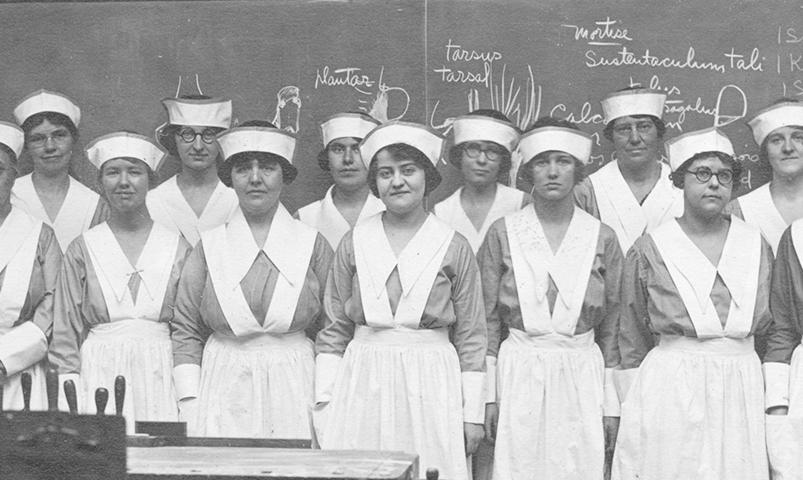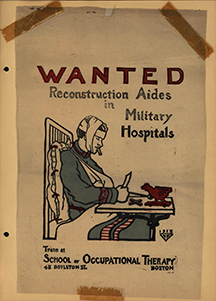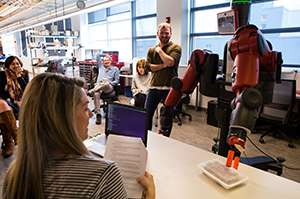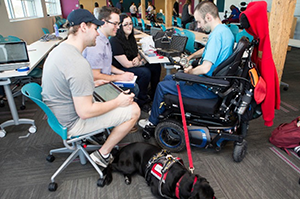A Century of Care and Innovation

In 1918, World War I was coming to a close and scores of injured soldiers were headed home. Many women were also overseas, treating the wounded as “reconstruction aides”, but most without a formal medical or rehabilitation education. To treat the incoming wave of men who would be thrown back into the workforce—many missing limbs or suffering brain injuries, the Surgeon General initiated the Boston School of Occupational Therapy (BSOT): Today’s Department of Occupational Therapy (OT) at Tufts University.
Fast-forward 100 years and the BSOT has moved from Boston’s Harcourt Street, where it built its reputation for training women from Smith and Radcliffe; to Harrison Avenue, where it formally joined Tufts in 1945; to the Collaborate Learning and Innovation Complex (CLIC) at 574 Boston Avenue on the Medford campus: a new home for a new century of learning.
When Collaboration “CLIC”s
Just as Harrison Ave. was the perfect location for OT as it partnered with Tufts’ School of Medicine, department chair Gary Bedell knows CLIC is the right spot for the years ahead. “The benefits of being in this building are in the title,” he says. “Students are exposed to interdisciplinary and inter-professional activities daily. We’re integrating more and more in the classroom, with engineering, human factors, computer science, community health—the list goes on.”
New occupational therapy courses are now often cross-listed with other departments. In one such course cross-listed with mechanical engineering, students are asked to problem solve collaboratively about designing assistive technology with people with disabilities.
Linda Tickle-Degnen, professor of occupational therapy and director of the Health Quality of Life Lab, and Matthias Scheutz, professor of computer science, are funded by the National Science Foundation to research how social robots can assist people with Parkinson’s. Post-doctoral students in both departments have supported the effort, developing how the robot would choose activities for the person with Parkinson’s based on facial recognition.
Bedell’s own research promotes social participation in adolescents and young adults with traumatic brain injuries using an app-based coaching intervention. Tufts students are trained as coaches and meet virtually (by phone or skype) with participants who are using the app to achieve social and participation goals. Bedell says the intervention is being adapted for other populations as well.
Sharan Schwartzberg has been with the department since 1979; 21 of those years as its chair. She says OT has been called ‘Tufts’ hidden crown jewel’ and agrees with Bedell on the importance of inter-professional education. “The integration beyond what we were doing with the medical and dental schools, to collaborate with colleagues in arts, sciences, and engineering, it’s become the standard,” she says, adding that technology gives better client outcomes. “Right now, the Baby Boomers need things like adaptive phones, as they have changes due to aging. The marriage of OT and technology is really going to be powerful.”
“We’re leveling the playing field for everyone,” Schwartzberg adds of the department’s person- and population-based focus. “We’re practice-based and focused on education, lifelong learning, and research. That’s our lens.”
The Newest Degree
Technology isn’t the only wave of the future the department, ranked sixth in the nation, is embracing: “We’re moving to an entry-level occupational doctoral or OTD program,” Bedell says of the profession’s mandate by 2027. The inaugural class begins in June 2019.
Jess Harney is the entry level program director and is spearheading the transition from an entry-level master’s to the new doctoral program. She sees big things for the newest class: “Our ability to have more scholarly experiences in innovation and simulation—two keys words for the department’s future—is tremendous.” Innovation and simulation will also be the focus of a new OT lab which will debut this year at CLIC and is made possible from the generous support of the Davenport Family Foundation in memory of Denise Meier—an occupational therapist who graduated from Tufts in 1987 and the OT graduate program in 1989. This continues the department’s interdisciplinary collaboration and, Harney adds, “our ability to impact the next generation of therapists.”
By Kristin Livingston


